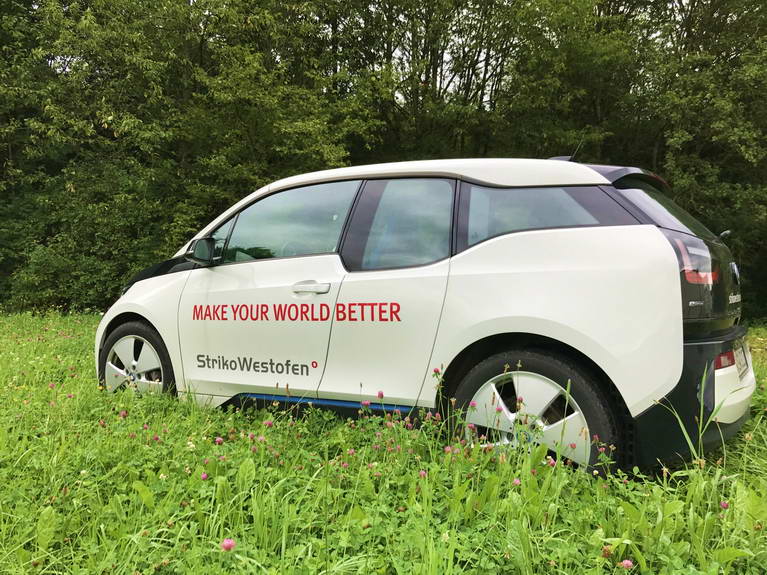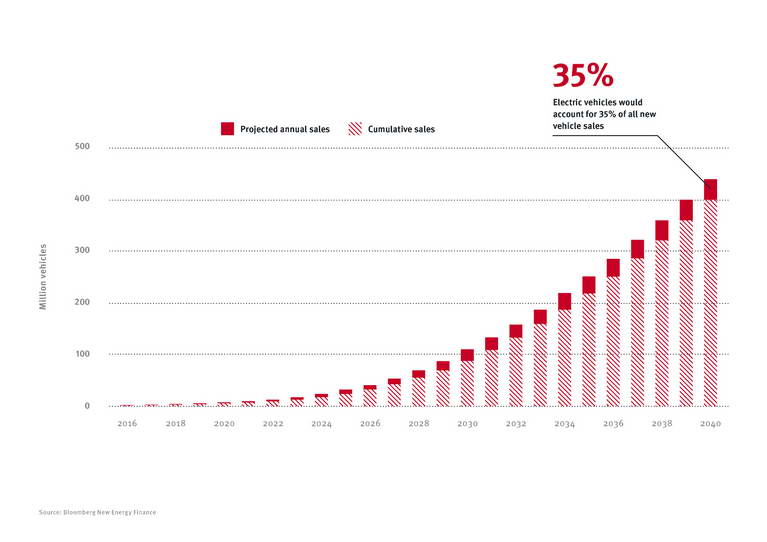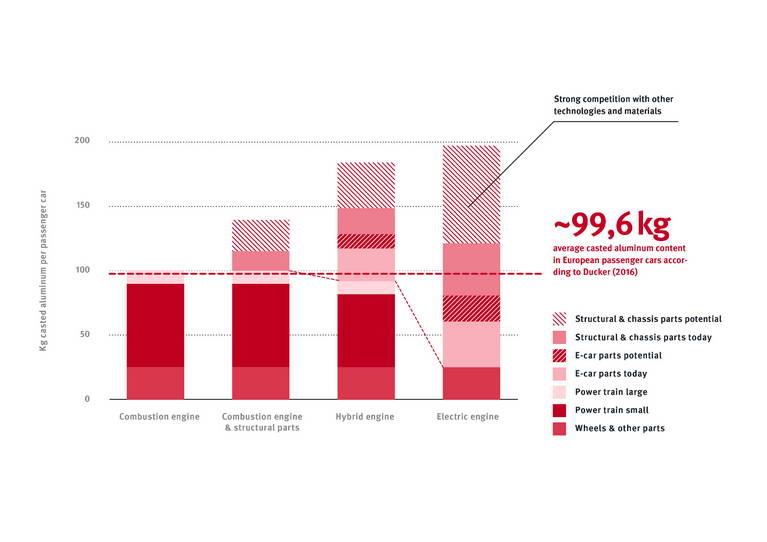
Convinced of green technology: an electrically powered company car is available to the employees at the headquarters of plant manufacturer StrikoWestofen.
The automobile industry is experiencing a strong trend towards electromobility. The figures and deadlines given vary, but as of 2025, the industry expects a considerable increase in the number of electric vehicles registered. The market penetration of electric cars will also cause a considerable increase in the use of light metal castings. These reduce the weight of the vehicle, thus increasing the ranges which can be achieved. For this reason, the imminent structural change is a growth opportunity for the aluminium casting industry. The approach pursued by the plant manufacturers? To stay competitive, you have to keep the costs per casting down.

Structural change: electromobility is becoming more and more relevant. It is considered as certain that the industry will experience a clear upturn from 2025 onwards.
Not only the automotive industry is experiencing a structural change at present – its suppliers and equippers are too. The subject of electromobility is becoming more and more relevant all the time. It is considered as certain that the industry for electric cars will experience an enormous upswing as of 2025 at the latest. This development means new opportunities for the light metal casting industry: to ensure longer ranges and offer more reasonably priced batteries for electric vehicles, you have to have less weight – and consequently lightweight components. Aluminium casting is in direct competition with alternative production processes and materials here. Its competitiveness is therefore defined via costs per casting.

The trend towards electromobility offers great opportunities for the light metal industry. Here the competitiveness of components made of cast aluminium is defined via costs per casting.
Plant manufacturers under obligation
In the traditional manufacture of aluminium castings, about 65 percent of all costs are caused by the metal used (the metal loss caused in the foundry has already been taken into account here). Another 15 percent are caused by the energy consumed, at least half of this being required for melting the metal and holding the melt at the necessary temperature. Another 15 percent are accounted for by the investment costs for the systems themselves. This means that plant manufacturers in particular have a crucial influence on the costs per casting. “If we want to be one of the winners of the structural change, it’s up to us to provide the necessary solutions here,” Rudi Riedel confidently explains. The manager of StrikoWestofen, manufacturer of thermal process technology with its headquarters in Gummersbach, promptly defines a whole series of influencing factors: user-friendly products, automation solutions, in-depth counselling for designing the overall system as well as process optimization, a faster return on investment (RoI) and a strong international presence with consistent service and product quality – these are just a few of the fields in which plant manufacturers feel obliged to provide solutions.

Different scenarios: The share of aluminium castings in future passenger cars is determined by the competitiveness of the aluminium casting industry.
Future-proof technology today
To be able to produce light metal castings economically with high quality, you need systems that are “of a piece”. The focus here is on melting and holding as well as heat treatment. The StrikoWestofen concept aims at ensuring a high availability of the overall process while also taking the optimization of individual process steps into account. For the field of melting, for instance, this means increasing the metal yield. Here the company relies on targeted temperature and flow control, state-of-the-art burner technologies as well as minimized excess air. The manufacturer has also optimized the energy efficiency of its “StrikoMelter” melting furnaces by incorporating the use of the waste air. In the field of dosing, too, the subjects of metal yield and energy efficiency are focused on in addition to dosing accuracy and process reliability. The corresponding products – like the dosing furnace “Westomat” itself or the melt transport system “Schnorkle” – are therefore designed as closed systems in which the melt is removed below the surface of the bath.
In the production of aluminium castings for electric cars, special attention is also paid to the final heat treatment. Here the starting point for StrikoWestofen is the holistic consideration of the process so that all necessary steps can be precisely coordinated. Progressive automation of all processes is to make sure that capacities are used optimally at all times, allowing savings to be made with regard to time, energy and personnel. “Affordability is still the watchword,” says Riedel, summing up. “As long as components made of cast aluminium or magnesium are not only a convincing proposition in terms of quality but remain affordable too, we see an opportunity and not a risk in the strong growth of electromobility.” The company recently put its optimism on show: an electrically driven company car is now parked in the grounds of the Gummersbach headqua
1. The copyright belongs to Foundry-Suppliers.Com (FSC for short), if any article, picture or other information has the mark of source: FSC. Without the authorization of the FSC, one can not reprint, editing or use in other ways; those who has been authorized by FSC, should used it within the scope of authorization and indicate the source:Foundry-Suppliers.Com. Otherwise, FSC will investigate for legal responsibility.
2. Any article, picture or other information without the mark of source: FSCare from other media, which aims to transfer more information, does not mean that FSC agrees with its view and takes responsibility for its authenticity, and does not assume the direct and joint liability of infringement. If other media, websites or individuals download it from FSC must reserve the manuscript source and take the responsibility of the copyright.
3. If it involves content, copyright and other issues, please contact FSC website in four weeks from the date of publication, otherwise deemed to give up the relevant rights.